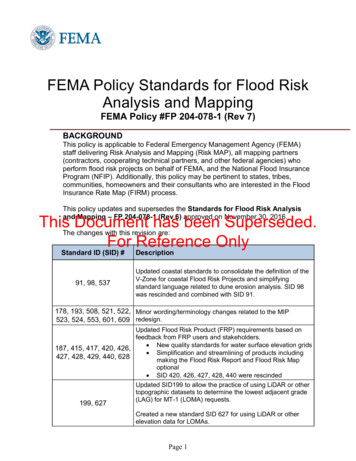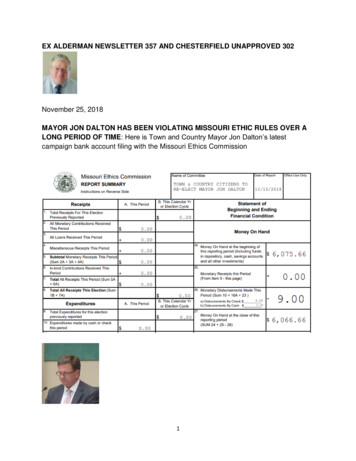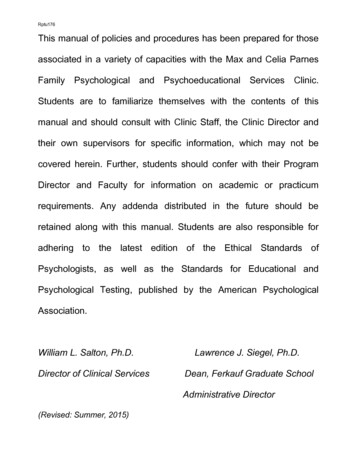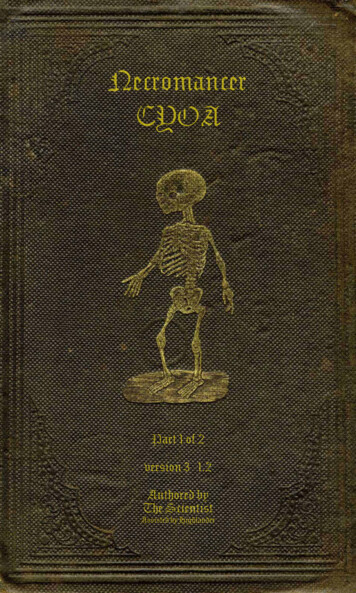
Transcription
A Body of Practical DivinityAuthor(s):Gill, John (1697-1771)Publisher:Grand Rapids, MI: Christian Classics Ethereal LibraryDescription:Subjects:In his book A Body of Practical Divinity, John Gill presentshis beliefs on the worship of God. The first section of his textfeatures advice to Christians participating in internal worship.According to Gill, the worshippers should experience thankfulness, humility, and self-denial as they commune with God.Next, Gill discusses the nature of public worship in the churchand the special worship duties that belong to pastors, deacons, and church-members. Finally, Gill reviews the dutiesshared by individuals who participate in private worship. Hewarns us that the Triune God must remain the sole object ofhuman worship. Gill's practical wisdom is useful for allChristians who aim to ensure that the act of worship is alwaysglorifying to God.Emmalon DavisCCEL Staff WriterDoctrinal theologyi
ContentsTitle Page1Book I. On the Worship of God.2Chapter 1. Of the Worship of God, or Practical Religion of the Object of Worship.3Chapter 2. Of Internal Worship, and of Godliness the Groundwork of it.9Chapter 3. Of the Knowledge of God.16Chapter 4. Of Repentance Towards God.29Chapter 5. Of the Fear of God43Chapter 6. Of Faith in God and in Christ55Chapter 7. Of Trust and Confidence in God80Chapter 8. Of the Grace of God92Chapter 9. Of the Grace of Love105Chapter 10. Of Spiritual Joy124Chapter 11. Of Peace and Tranquility of Mind137Chapter 12144Chapter 13. Of Thankfulness to God156Chapter 14. Of Humility167Chapter 15. Of Self-Denial174Chapter 16. Of Resignation to the Will of God182Chapter 17. Of Patience190Chapter 18. Of Christian Fortitude196Chapter 19. Of Zeal204Chapter 20. Of Wisdom or Prudence212Chapter 21. Of Godly Sincerity219Chapter 22. Of Spiritual Mindedness226Chapter 23. Of a Good Conscience233Chapter 24. Of Communion with God240ii
Book II. On External Worship, as Public248Chapter 1. Of the Nature of a Gospel Church, the Seat of Public Worship249Chapter 2. Of the Duties of the Member of a Church to Each Other260Chapter 3. Of the Officers of a Church, Particularly Pastors266Chapter 4. Of the Duties of Members of Churches to their Pastors287Chapter 5. Of the Office of Deacons294Chapter 6. Of the Discipline of a Church of Christ303Book III. Of the Public Ordinances of Divine Worship319Chapter 1. Of Baptism320Chapter 2. Of the Lord’s Supper349Chapter 3. Of the Public Ministry of the Word363Chapter 4.Of Public Hearing the Word376Chapter 5. of Public Prayer387Chapter 6. Of the Lord’s Prayer400Chapter 7. Of Singing Psalms, as a Part of Public Worship414Chapter 8. Of the Circumstances of Public Worship, as to Place and Time425Book IV. Of Private Worship, or Various Duties, Domestic, Civil, and Moral438Chapter 1. Of the Respective Duties of Husband and Wife.439Chapter 2. Of the Respective Duties of Parents and Children445Chapter 3. Of the Respective Duties of Masters and Servants451Chapter 4. Of the Respective Duties Of Magistrates and Subjects.456Chapter 5. Of Good Works in General464Chapter 6. A Compendium or Summary of the Decalogue or Ten Commands469Book V. A Dissertation Concerning the Baptism of Jewish Proselytes475Chapter 1. A Dissertation Concerning the Baptism of Jewish Proselytes Of theVarious Sorts of Proselytes Among the Jews.476Chapter 2. The Occasion of this Dissertation483Chapter 3. The Proof of the Baptism of Jewish Proselytes Inquired Into; Whetherthere is any Proof of it Before, At, or Quickly After the Times of John and Christ.487Chapter 4. The Proof of this Custom only from the Talmuds and TalmudicalWriters.500iii
Chapter 5. The Reasons Why Christian Baptism is not Founded on, and TakenFrom, the Pretended Jewish Baptism of Israelites and Proselytes.Indexes509522Index of Scripture References523Greek Words and Phrases533Hebrew Words and Phrases537Latin Words and Phrases540iv
This PDF file is from the Christian Classics Ethereal Library, www.ccel.org. The mission ofthe CCEL is to make classic Christian books available to the world. This book is available in PDF, HTML, ePub, Kindle, and other formats. Seehttp://www.ccel.org/ccel/gill/practical.html. Discuss this book online at http://www.ccel.org/node/3601.The CCEL makes CDs of classic Christian literature available around the world through theWeb and through CDs. We have distributed thousands of such CDs free in developingcountries. If you are in a developing country and would like to receive a free CD, pleasesend a request by email to cd-request@ccel.org.The Christian Classics Ethereal Library is a self supporting non-profit organization atCalvin College. If you wish to give of your time or money to support the CCEL, please visithttp://www.ccel.org/give.This PDF file is copyrighted by the Christian Classics Ethereal Library. It may be freelycopied for non-commercial purposes as long as it is not modified. All other rights are reserved. Written permission is required for commercial use.v
Title PageA Body of PRACTICAL DivinityBYJOHN GILL, D.D.1
Book I. On the Worship of God.Book 12
Chapter 1. Of the Worship of God, or Practical Religion of the Object of Chapter 1OF THE WORSHIP OF GOD,or Practical Religion Of the Object of WorshipHave, in the former part of this work, proved there is a God, from the light of natureand reason, from the works of creation, &c. and now my business is to show that this Godis to be worshipped; I have treated of the nature, perfections, and attributes of God, whichare the foundation of the worship of him; and now I shall treat of worship itself. I haveconsidered the various works of God, the works of creation, providence, and grace; andthese may be used as so many arguments to engage us to divine worship, or as so manyreasons why we should glorify God with our bodies and spirits, which are his; or, in otherwords, worship him both internally and externally; and I shall begin with the object ofworship, for which we have a plain direction, “Thou shalt worship the Lord thy God, andhim only shalt thou serve” (Matthew 4:10). Two things are to be observed and considered(1) That the Lord God is the object of worship. (2) That he alone is the object of worship,to the exclusion of all others.1. The object of worship is the Lord God, God essentially and personally considered.1a. First, God essentially considered, or as considered in his nature and essence, whichis the foundation of worship. Many are the directions and instructions given to “worshipGod”, without specifying any of the persons in the Deity particularly to be worshipped; (seeRev. 14:7; 19:10; 22:9). The “Lord” is to be worshipped; the Lord, who is the one Jehovah,and whose name alone is Jehovah (Deut. 6:4; Ps. 83:18). The word “Lord” in the New Testament answers to “Jehovah” in the Old, a name expressive of the existence or being of God,and of him as the fountain of being, and the author of being to all others; who is the everlasting “I am, which is, and which was, and which is to come”; these words of John are aproper deciphering of the word “Jehovah”, or the “I am that I am” in (Ex. 3:14). Now hewhose essence is simple, uncompounded, immutable, infinite, eternal, &c. is to be worshipped, even the Lord “thy” God, thy Creator, thy Benefactor, thy Supporter, and Preserver.Thus the apostle describes the proper object of worship unknown to the Athenians, as hewho made the world, and all things in it; and gives life, and breath, and all things to hiscreatures; and in whom they live, move, and have their being (Acts 17:23, 25, 28). ThusJacob invoked God, which to do is a part of religious worship, who had “fed” him “all” his“life long to that day” (Gen. 48:15). David says, his prayer, which is a part of worship, shouldbe to the “God of his life”, who had given him life and upheld him in it (Ps. 42:8), he whois the “true God”, the “living God”, and the “everlasting King”, is the object of worship; thetrue God, in distinction from nominal gods, from such who are falsely so called; the livingGod, in distinction from idols of gold and silver, the work of men’s hands, lifeless statues,in whom there is no breath; but the true God, and who is to be worshipped, has life in and3
Chapter 1. Of the Worship of God, or Practical Religion of the Object of of himself, originally and underivatively, and is the fountain and giver of life to others, andfrom everlasting to everlasting he is God. He is by nature God; there are some who are notso, and therefore not to be served and worshipped (Gal. 4:8), but God is a spirit, is of aspiritual nature, and to be worshipped in spirit and in truth; his nature is most perfect, hasall perfections in it, though there is no finding him out unto perfection; his nature is infiniteand incomprehensible, beyond all conception and thought, beyond all words and expressions,exalted above all blessing and praise. The name of God, the very first name by which he iscalled in scripture, “Elohim” (Gen. 1:1), implies worship, and that he is to be worshippedwho created the heavens and the earth, for it comes from a word (See the Body of DoctrinalDivinity, Book 1, Chapter 3) which signifies to worship. And to this the apostle seems toallude when he says that antichrist exalts himself “above that is called God”, or “that isworshipped”, intimating that the name of God signifies σεβασμα, the object of worship (2Thess. 2:4).1b. Secondly, God personally considered, or God considered in the three persons, is theobject of worship. “The Father, the Word, and the Holy Ghost, and these three are one”,are one God, and so equally the object of divine worship.1b1. First, The Father, of whom Christ expressly says, that men shall “worship theFather” (John 4:21, 23), and of the propriety of this there can be no doubt, since his Deityis not denied by any, and was it, they would easily be confronted; he is expressly called “Godthe Father” (Phil. 2:11), and sometimes “God even the Father” (1 Cor. 15:24; 2 Cor. 1:3), allthe perfections of Deity are attributed to him, as immutability, eternity, &c. and the worksof creation, providence, and grace; and he has undoubtedly a proper claim of worship fromhis creatures, and accordingly worship is given to him, and acts of it are exercised on him.Baptism, which is a solemn act of religious worship under the New Testament dispensation,is administered in his name; and his name stands first in the form of it, baptizing in thename of the Father”, &c. which signifies not only its being done by his authority and command, but the persons, by submission to it, devote themselves to him, profess to be his, andlay themselves hereby under an obligation to serve him; and because to do this in the nameof a creature would be idolatry and irreligion, the apostle Paul was thankful that he hadbaptized no more of the Corinthians than he had, when he found they were for setting himup as the head of a party among them, lest they should think they were baptized in his name.Prayer is another part of divine and religious worship, which is made to the Father, and indeed is generally made to him; the access and address are most frequently to him, not butthat they may be equally made to the other two persons, as will be presently seen; but thereason why they are usually to him is because he bears no office, whereas the others do, andan office which is concerned in the business of prayer. Christ is the mediator through whomthe access is, and in whose name the petition is put up; and the Spirit is the spirit of supplication, by whose aid and assistance prayer is made: the whole of this may be observed in one4
Chapter 1. Of the Worship of God, or Practical Religion of the Object of passage; for “through him”, through Christ the mediator, “we both”, Jews and Gentiles,“have an access” at the throne of grace “by one spirit”, who helps and assists us in our supplications “unto the Father”, the Father of Christ and of us (Eph. 2:18), see an instance of alarge prayer of the apostles to the Father of our Lord Jesus Christ in (Eph. 3:14-21), and itis easy to observe, that at the beginning of many of the epistles such a prayer or wish is made,as “Grace be to you, and peace from God our Father”, as distinguished from the Lord JesusChrist; which is a petition for grace, an increase of grace, and all necessary supplies of it,and for all spiritual prosperity and happiness. Thanksgiving, another act of religious worship,which is sometimes included in prayer, and sometimes performed as a distinct part ofworship, is made to the Father. “Giving thanks always for all things” for all temporal andspiritual blessings, “unto God and the Father”, the Father of Christ and of us in him, “in thename of our Lord Jesus Christ” (Eph. 5:20). Acts of faith, hope, and love, which are acts ofworship, are exercised on him; “ye believe in God”, that is, in God the Father (John 14:1),who raised Christ from the dead; that “the faith and hope” of saints “might be in God” theFather, who raised him from thence (1 Pet. 1:21), and where those graces are love is, and isexercised on the same object; and as the Father was the object of Christ’s love as man andmediator, so he is the object of the love of those that believe in him (John 14:31).1b2. Secondly, the Word, or Son of God, is also the object of worship; “he is thy Lord,and worship thou him” (Ps. 45:11), yea, he is to be worshipped with the same sort of worship,and to be honored with the same degree of honour the Father is (John 5:23), for he is theLord, the Jehovah, thy God, as Thomas said, “My Lord, and my God”; the mighty God, thegreat God, God over the true God and eternal life; who has the same perfections his Fatherhas; and the same works his Father does are done by him (Col. 2:9; John 5:19), and thereforeto be worshipped with the same worship, and so he is. Baptism is administered in his nameequally as in the Father’s “baptizing them in the name of the Father, and of the Son”, &c.and sometimes his name on
The Proof of this Custom only from the Talmuds and Talmudical 500 Writers. iii. Chapter 5. The Reasons Why Christian Baptism is not Founded on, and Taken 509 From, the Pretended Jewish Baptism of Israelites and Proselytes. Indexes 522 Index of Scripture References 523 Greek Words and Phrases 533 Hebrew Words and Phrases 537 Latin Words and Phrases 540 iv. This PDF file is from the Christian .











